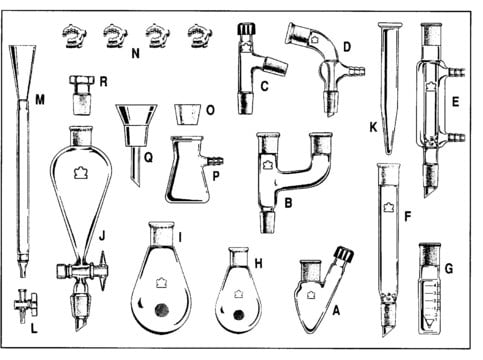Z245240
ACE microscale glassware kit
MICRO/MINI-Lab® Basic kit II
Sign Into View Organizational & Contract Pricing
All Photos(1)
About This Item
UNSPSC Code:
41100000
NACRES:
NB.43
Recommended Products
manufacturer/tradename
Ace Glass 9560-30
Looking for similar products? Visit Product Comparison Guide
General description
All joints threaded 14/10, supplied in a clear, flexible plastic box with tilt lid. Includes magnetic "V" stirrer (not shown).
Designed to give students experience with a wide range of organic reactions with increased safety. Kits contain microscale glassware needed to perform experiments described in the textbook Microscale Organic Laboratory with Multistep and Multiscale Syntheses.
Greaseless, threaded ST14/10 connections can be interfaced with traditional ST14/10 joints. Conical reaction vials include open-top caps, septa, and O-rings. Glassware in the DELUXE kit is supplied in a foam-lined plastic carrying case. The BASIC kit is supplied in a clear plastic, compartmentalized box with tilt lid.
Greaseless, threaded ST14/10 connections can be interfaced with traditional ST14/10 joints. Conical reaction vials include open-top caps, septa, and O-rings. Glassware in the DELUXE kit is supplied in a foam-lined plastic carrying case. The BASIC kit is supplied in a clear plastic, compartmentalized box with tilt lid.
Legal Information
Micro/Mini-Lab is a registered trademark of Ace Glass, Inc.
related product
Product No.
Description
Pricing
Certificates of Analysis (COA)
Search for Certificates of Analysis (COA) by entering the products Lot/Batch Number. Lot and Batch Numbers can be found on a product’s label following the words ‘Lot’ or ‘Batch’.
Already Own This Product?
Find documentation for the products that you have recently purchased in the Document Library.
Customers Also Viewed
Xi Chen et al.
Immunobiology, 221(1), 48-55 (2015-08-27)
Macrophages function as an essential component of innate immune system, contributing to both the initiation and appropriate resolution of inflammation. The exposure of macrophages to the microbial products, such as lipopolysaccharide (LPS), can strongly shift the balance between tissue homeostasis
Xia Pan et al.
Food chemistry, 188, 569-575 (2015-06-05)
Polygalacturonase is one of the most important industrial pectinases. To enrich the genetic resources and develop new enzyme candidates, three polygalacturonase genes (Nfpg I-III) of glycosyl hydrolase family 28 were cloned from Neosartorya fischeri P1 and functionally expressed in Pichia
Ze-Quan Mo et al.
Fish & shellfish immunology, 47(1), 280-288 (2015-09-20)
CCR6 have been demonstrated playing an important role in immune cells homing to mucosal tissues, mediating antigen presentation and immune response in mammals. CCR6 in lower vertebrate leukocyte homing has not yet been revealed. Cryptocaryon irritans is believed to be
Our team of scientists has experience in all areas of research including Life Science, Material Science, Chemical Synthesis, Chromatography, Analytical and many others.
Contact Technical Service










